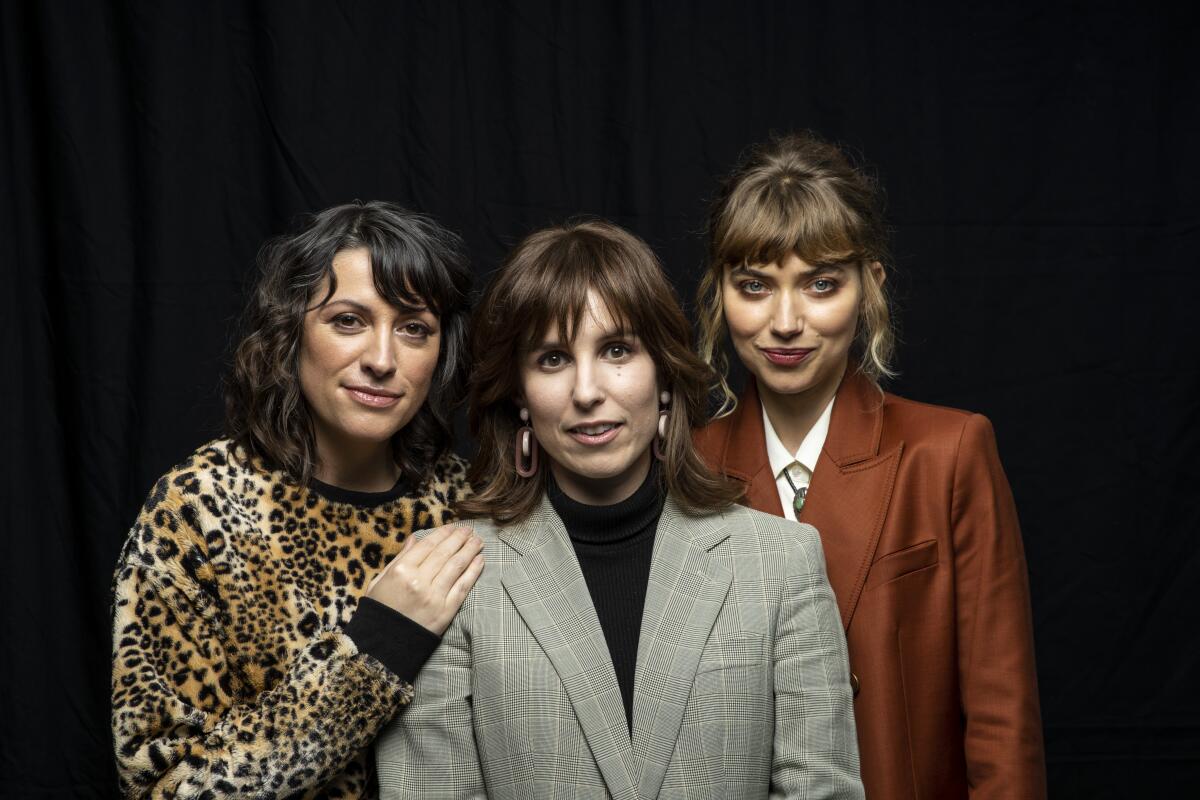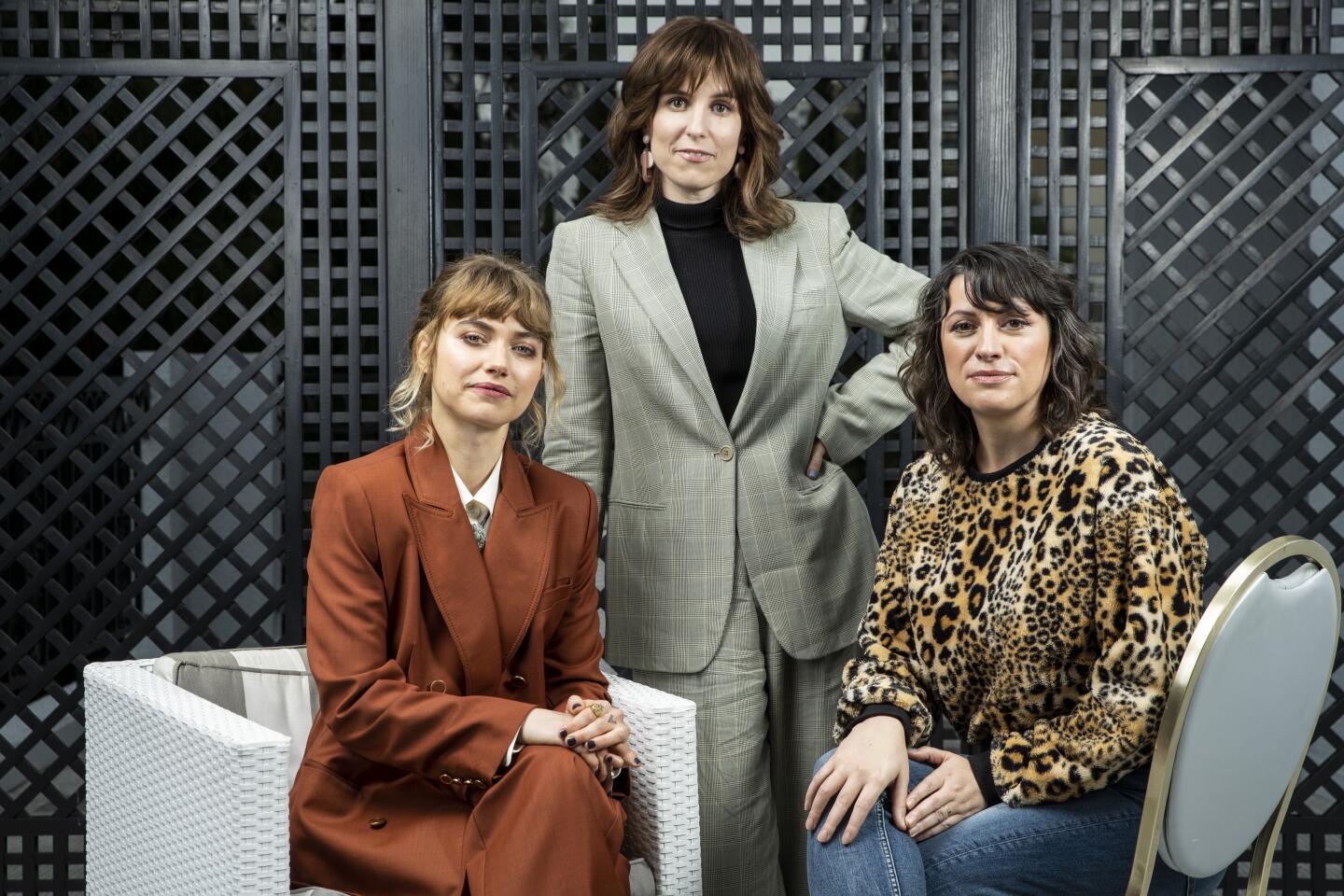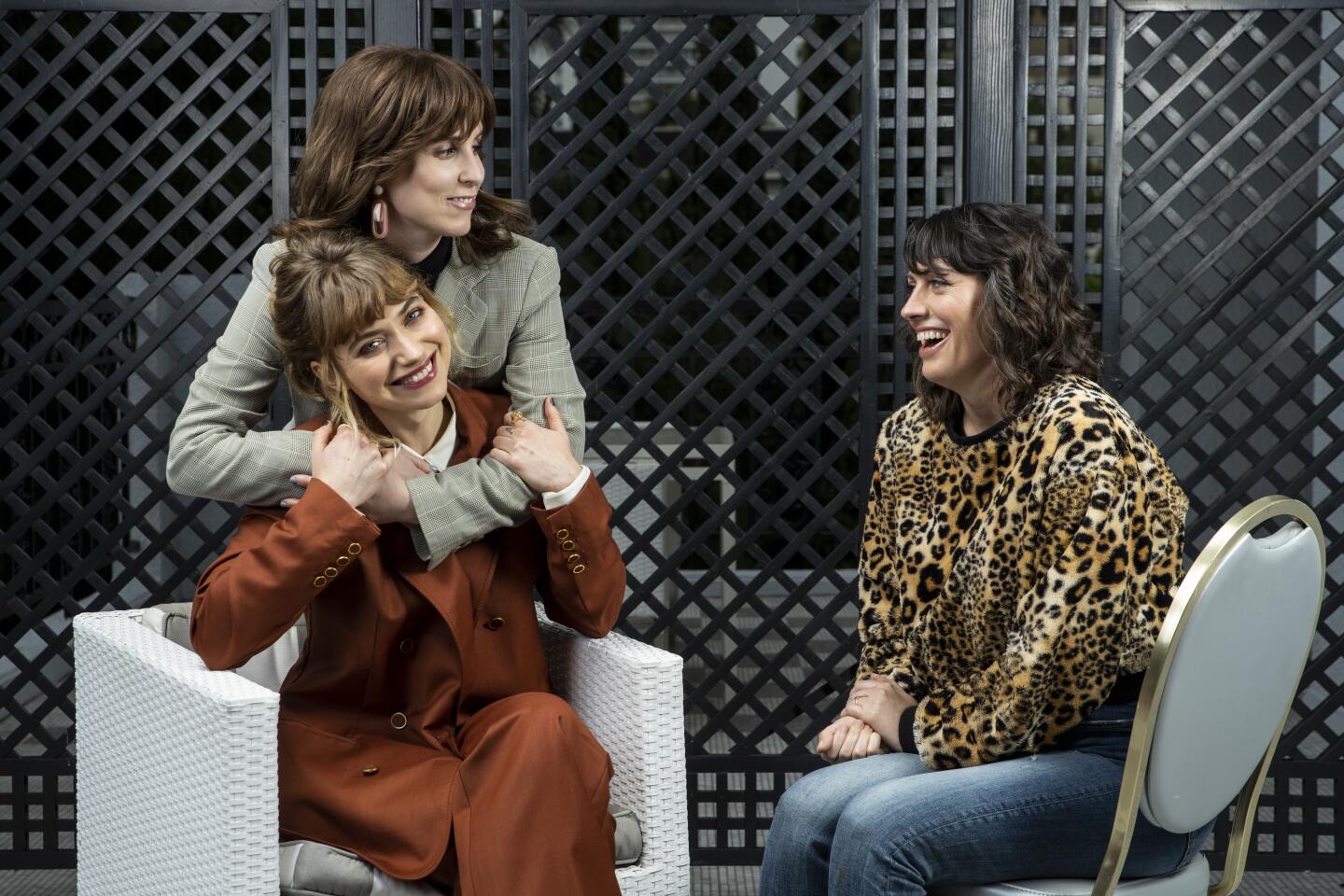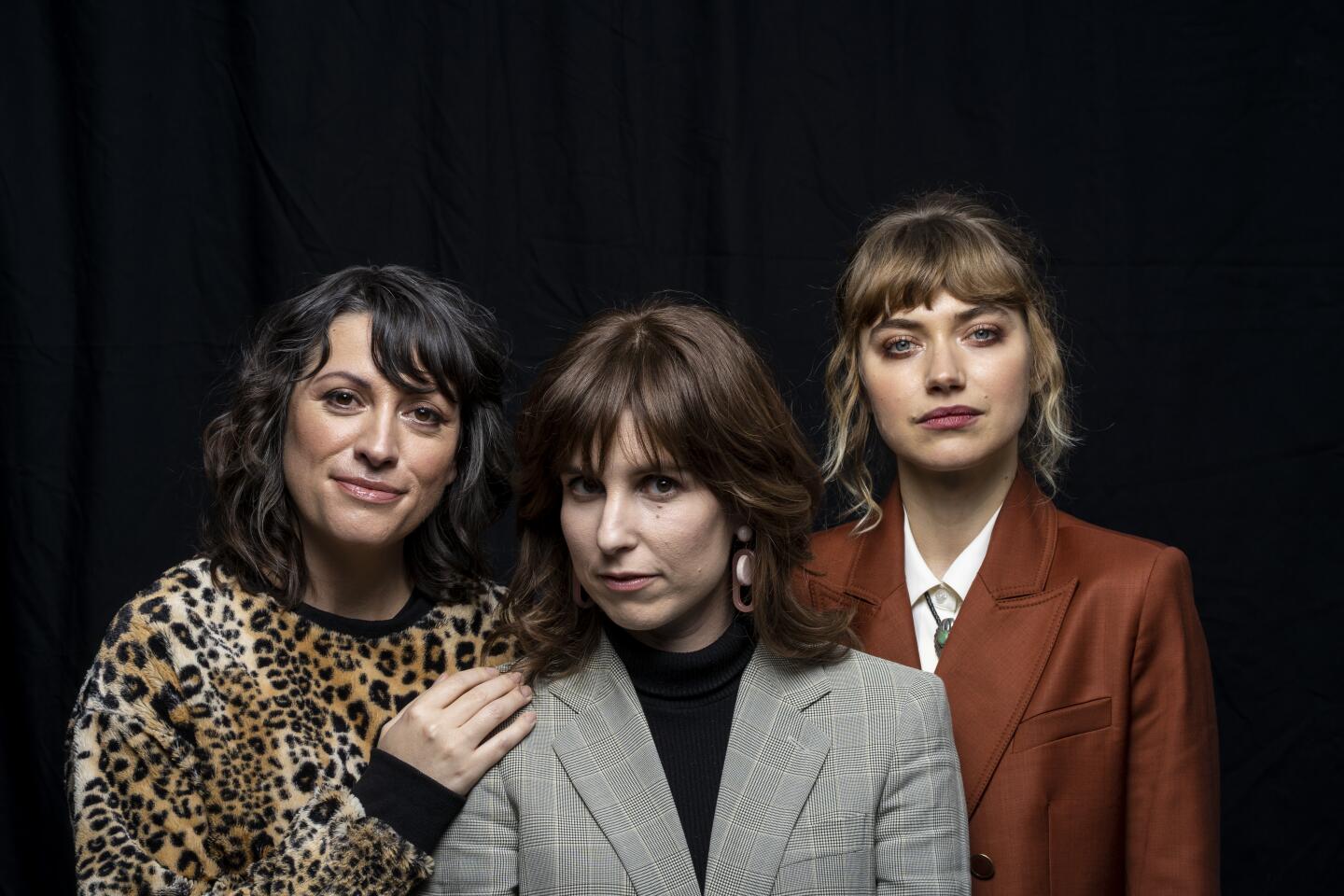How ‘Black Christmas’ became a ‘fiercely feminist’ slasher movie for the #MeToo era

- Share via
A few years after Donald Trump’s election coincided with the birth of the #MeToo movement and mere months after the appointment of Brett Kavanaugh to the U.S. Supreme Court, director Sophia Takal set out to write a horror movie about being a woman in 2019.
“I just felt tapped into a lot of the rage that women felt and also a lot of the camaraderie that we felt with one another,” she said. “I wanted to make a movie that wasn’t about women being pitted against each other but finding strength through one another.”
The resultant film, Universal’s “Black Christmas” remake, turns the 1974 horror cult classic on its head by exploring the adversarial relationship between fraternity and sorority members at the fictional Hawthorne College. The updated movie, in theaters this weekend, stars Imogen Poots as Riley Stone, a sorority girl and sexual assault survivor who demands answers after several women go missing over the holiday break.
Where the original centered on a group of girls terrorized by a killer hiding out inside their sorority house (it was the first film to use the “calls are coming from inside the house!” trope), Takal and screenwriter April Wolfe, who cowrote the script for Blumhouse, wanted to imbue the traditional slasher story with a nuanced portrait of female solidarity and a timely examination of the entrenched nature of misogyny.
“When Blumhouse approached me about making this, one thing that was really important to me was making a movie that felt like it was moving the slasher subgenre forward,” said Takal. “We weren’t just making a movie about expendable women whose primary purpose was to be killed for entertainment.
“When we started to write this movie, we had just gone through this whole reckoning and a lot of men were being called out for their bad behavior,” she added. “Then all of a sudden Louis C.K.’s doing comedy again, people are getting book deals and going back on the air. And I felt a little bit of that feeling that you can’t ever really let your guard down.”
In response, the filmmaker resolved to make a PG-13 horror movie that would frankly address tough issues like sexual assault and rape while remaining accessible to young women and girls.
“At one point I just assumed the MPAA would automatically give it an R rating because we’re dealing with issues of sexual assault,” said Takal. “But we shot it with the intention of a PG-13 rating. I was very vocal about the fact that if I had to pull back on any of the specificities of Riley’s experience or the sexual politics of the movie, that would be a problem for me. That was really the only sticking point.”
Ultimately, the subject matter was less of a concern to the MPAA than some of the film’s language. “It’s so funny the things that are allowed and not allowed,” said Takal. “Like ‘The Dark Knight’ and ‘Taken’ are PG-13 movies but ours would’ve been R-rated if we said ‘slipped me a roofie and then your dick.’”
“It’s really up to the discretion [of the MPAA],” said Wolfe. “And its discretion is not consistent across the board. But how cool is it that young girls get to see this ... movie?”
To illustrate an intersectional portrait of feminism, Takal and Wolfe made sure to incorporate female experiences that differed from their own. For example, the character Kris (played by Aleyse Shannon) is a mixed race woman and a social justice crusader who frequently butts heads with her fellow sorority members.
“From the beginning it was a matter of having a cast that felt inclusive while being aware of our own biases,” said Wolfe. “We live in Los Angeles. My life is not [filled with] a lot of white people. Reflecting what most people feel or see in everyday life onscreen felt really important in the same way that we wanted the women to feel realistic.
“I mean, we are white women and we have lived in this world for a long time so I think there is a tendency to kind of just write that experience but I think that is maybe incorrect,” she added. “It’s not OK to do at this point. We want people to feel good and for these characters to be rounded. And if we weren’t hitting that then we would do a quick rewrite or reassessment.”
For Takal, who calls the film “fiercely feminist,” seeing a nuanced portrait of women depicted onscreen in and of itself is revolutionary. “I think there’s something still subversive about making movies that are about real women who are complicated and flawed and don’t have to be perfect,” she said.
“I think a lot of times in this modern era people talk about strong women and sometimes people mistake flawless, badass women with feminist characters. I think part of being a woman and making movies about women is allowing us to be flawed.”
“We might all be on the ‘same side’ but there’s definitely different lived experiences,” said Wolfe. “You can’t just be like ‘All women are really great together all the time.’”
“Exactly,” Poots agreed. “I felt that certainly in the quartet of girls, all of their idiosyncrasies were there but they’re all fundamentally different women with different priorities.”
While Wolfe describes being a woman in 2019 as “... terrible sometimes,” she says one of the biggest barriers to meaningful change is the inability for people on opposing sides to hear each other.
“The feeling of people talking past one another sometimes feels like an insurmountable problem,” Takal agreed. “Like, how can we open up to each other? I think one of the things we hope for with this movie is that it’s a fun holiday horror movie, but that it also is saying something about a particular experience. And maybe it will open up people to talk about their own experiences and have less defensive conversations.”
“Certain people have had the podium for a long time and it’s time for other people to take the opportunity to listen,” said Poots.
“Yeah, I think it’s about listening,” said Takal. “I think some people are hesitant to listen because it feels like something is being taken away. And it can feel like eating spinach if you’re watching a harrowing drama about men and women and rape, but if you’re able to give people an opportunity to laugh and scream, it kind of mitigates the dialogue that we’re trying to have.”
“Genre movies open up an incredible platform for female performance,” added Poots. “Often more than other films do. I think with the nature of horror movies in general, there’s a reason why Toni Collette’s performance in ‘Hereditary’ was so lauded.”
And ultimately the opportunity to have female filmmakers shaping those performances is what most excited all three women about “Black Christmas.”
“Growing up, the place that you would see lead actors who were women was in horror or soap operas,” noted Wolfe. “I love a melodrama and I love horror and we have some aspects of both in our movie. It’s a great genre, it just sucks that women haven’t been able to tell those stories before. Now we get to be behind it and have more control over those dynamic female characters.”
More to Read
Only good movies
Get the Indie Focus newsletter, Mark Olsen's weekly guide to the world of cinema.
You may occasionally receive promotional content from the Los Angeles Times.














